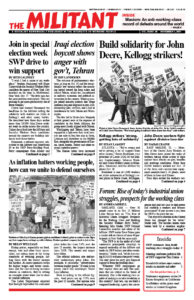Rising prices, especially on food, energy, rent and other basic necessities, are eating away at the living standards of working people, hitting those with the lowest income the hardest. As more unionists strike for higher wages and better conditions and for cost-of-living increase clauses in contracts, they’re setting an example about what can be done to combat inflation.
The Labor Department reported that through September the consumer price index has risen 5.4% over the past 12 months, the largest increase since 2008. This means real wages have fallen.
The official inflation rate deliberately undercounts price hikes. For example, it calculates “substitutions between similar goods.” If steak is too pricey, you’ll buy hamburger. Voila! Less inflation.
Even according to the official figures, beef prices are up 17.6% over the past 12 months. But anyone who goes to the grocery store knows that in reality the price hikes have been much higher. And energy prices have already shot up nearly 25%, before the start of winter. The national median rent has increased 16.4% since January.
The impact of inflation is class-divided. Every Sunday the London Financial Times — read by many of the super-rich as well as their upper-middle-class hangers-on — prints a slick magazine called “How to Spend It.” It doesn’t have advice on how to clip coupons or save money. Instead, it’s filled with ads for obscenely expensive designer clothes, gadgets and diamond-studded Swiss watches. They’re not worried about prices.
Higher wages don’t cause inflation
The capitalists and their government seek to turn “consumers” — that is millions of fellow working people — against workers who are demanding better pay.
They claim that higher wages are the reason for soaring prices. But that’s simply not true.
Bosses pay workers less than the value of what we produce. The “surplus” — after taking out what is necessary to replace machinery, etc. — goes to the capitalist owners as profits.
“Since the capitalist and workman have only this limited value, that is, the value measured by the total labor of the working man, the more one gets the less the other will get, and vice versa,” revolutionary working-class leader Karl Marx explained in detail in Value, Price and Profit in 1865.
When workers go on strike and win higher wages, it just means the boss gets a smaller portion of the surplus we create, and we get more.
Bosses have other ways to increase their share of the value we produce with our labor. Over the last year bosses have pushed to increase “productivity,” their word for speed-up. A major issue in most of today’s strike battles is longer and longer work days and weeks imposed by Kellogg’s and other employers, another way they increase the proportion of our labor they appropriate.
Capitalist governments have printed money and raised their debts to unimaginable heights, both to shore up profits and to try to head off working-class resistance. The U.S. government debt as of Oct. 1 was $28.8 trillion.
The Federal Reserve through its “quantitative easing” scheme is buying up $120 billion a month in government-backed bonds, to keep interest rates low. It hopes banks will offer loans at nearly zero interest to encourage companies to create new jobs. But the capitalist class finds it’s more “profitable” to speculate on various forms of financial paper instead.
Inflation usually arises when “governments and banks crank out money in various paper forms, eventually far outstripping the output of commodities that could be purchased with that money,” writes Jack Barnes, Socialist Workers Party national secretary, in New International no 10. “Under such conditions, competing capitalist commercial interests bid prices up and up and up and up, in an ultimately self-defeating effort to reap surplus profits.”
Exacerbating inflation today are supply-chain bottlenecks, including the backlog of container ships unable to unload at ports in Los Angeles and Long Beach, California, and Savannah, Georgia.
In the U.S. there’s a shortage of 60,000 truck drivers nationwide. The Joseph Biden administration, in collaboration with the two California port owners, Walmart and other giant corporations will institute a 24/7 logistics work schedule. Bosses at all these companies will use these moves to press for longer hours and speedup.
Strikes are key to fight higher prices
It’s on the picket lines, with the growing number of striking workers, that unions are in the strongest position to lead a fight for protection against inflation and speedup, and for decent wages, benefits and dignity on the job.
“Unions need to fight for automatic cost-of-living adjustments in every contract, all retirement benefits and Social Security to offset every price rise,” Malcolm Jarrett, SWP candidate for mayor of Pittsburgh, told the Militant.
“Employers have been on an offensive to weaken or eliminate them from union contracts where they have existed, like they’re trying to do at Kellogg’s and John Deere plants today,” he said.
“As the labor movement gets stronger, workers can fight for the establishment of price committees of our unions, farmers’ organizations, housewives and others to force the bosses to open the books and take control over setting prices,” Jarrett said. “This will help show farmers and small-business owners that it’s the bosses’ profiteering, not workers’ wage demands, that cause inflation.”


